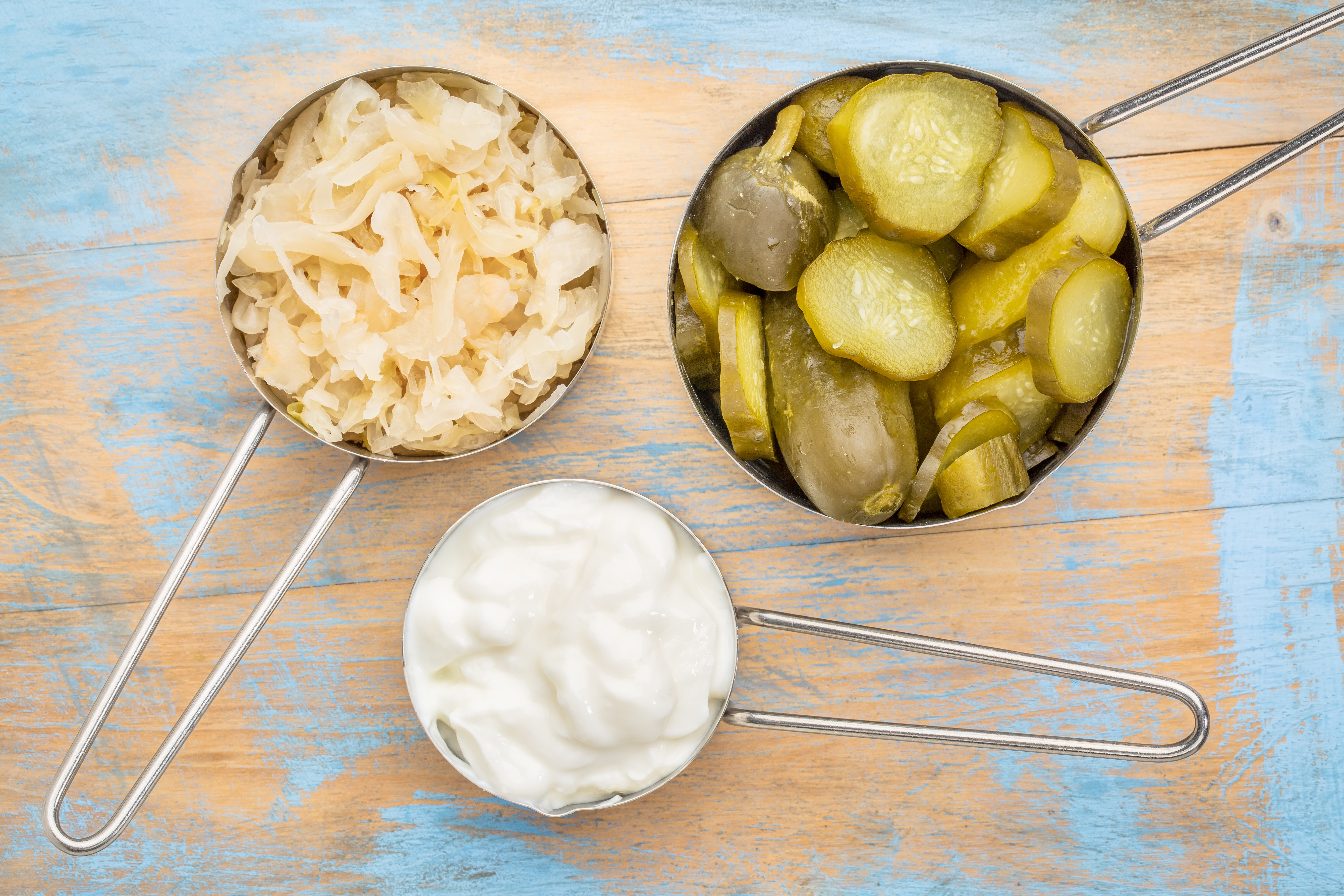
Fermented foods are foods that are exposed to certain bacteria, leading to the breakdown of carbohydrates and the development of beneficial microorganisms in the food, which results in a product that is tangier with nutrients that are more accessible.
During fermentation, the starches and sugars in the food are converted into lactic acid by the bacteria lactobacilli, which is what gives fermented foods their unique sour flavor and smell. This process is also what makes them super nutritive. While the thought of ingesting microorganisms might initially gross you out, that’s a qualm you ought to get over. Aside from the fact that fermented foods are delicious, they offer a handful of health benefits that can make for a healthier you.
Gut health. For your gut to be healthy and operating optimally, there needs to be the right balance of “good” bacteria (probiotics) and bad bacteria. Little things, like stress and antibiotic use, can throw this ratio off. The fermentation process makes for foods that are packed with probiotics, the “good” bacteria, and thus eating them helps to maintain the proper balance of bacteria in the gut. In scientific terms, eating fermented foods reflorates the gut. Among other health benefits, studies indicate that preserving a healthy gut may lower the risk for colon cancer.
Weight loss. Bacteria regulate the inflammatory response in your body. By eating fermented foods, you can reduce low-grade inflammation in the body which may be preventing you from losing weight. One study published in the British Journal of Nutrition showed that specific bacteria supplementation helped obese women to achieve sustainable weight loss.¹ Further, other studies show that restoring the gut to a healthy state aids in achieving and maintaining a healthy weight, as gut microbes influence the body’s insulin resistance and deposition of excess calories in fat stores.
Improved digestion. The healthy bacteria in fermented food produce enzymes that break down food, making the nutrients more easily accessible for the body, and keeping the food moving along nicely. In particular, consuming fermented vegetables can have twice the benefits since they are often a good source of fiber, which aids in sustaining a healthy gut microbiome as well. Have low-sodium sauerkraut or pickles on hand and top your sandwiches or salads with this good-for-you flavor punch. A study published in the Journal of Dairy Science explained the substantial benefits of probiotic bacteria on both gut health and the immune system in just a two-week trial.²
Boosts your immune system. Health promoting probiotics help preserve a healthy mucosal lining in your digestive tract that serves as a physical barrier for harmful substances and aids in the production of infection-fighting antibodies. Tempeh, a popular vegetarian protein source made from fermented soybeans, is a great source of such probiotics. One half cup of tempeh contains 160 calories and 16g of protein. Steamed, blackened, or crumbled onto a soup or salad, these are all great ways to incorporate this protein powerhouse into your meals. You can find tempeh at Whole Foods or other specialty markets.
Detoxification. With some conscious effort, it is possible to reduce the amount of toxins that enter our bodies. But complete evasion of toxins is rare. Consuming fermented foods is a proactive means of fighting toxins in the body, as they possess the unique ability to degrade or destroy toxins and remove them from the body. For the more adventurous, try drinking kombucha. A fermented, tangy and fizzy tea, kombucha can be found in health food stores or even in some local groceries, and it comes in a variety of unique flavors.
References:
- Marina Sanchez, et al. Effect of Lactobacillus rhamnosus CGMCC1.3724 supplementation on weight loss and maintenance in obese men and women. British Journal of Nutrition, 111, pp 1507-1519. doi:10.1017/S0007114513003875.
- Wang, S. et al. Fermented milk supplemented with probiotics and prebiotics can effectively alter the intestinal microbiota and immunity of host animals. Journal of Dairy Science. Volume 95 , Issue 9 , 4813 – 4822